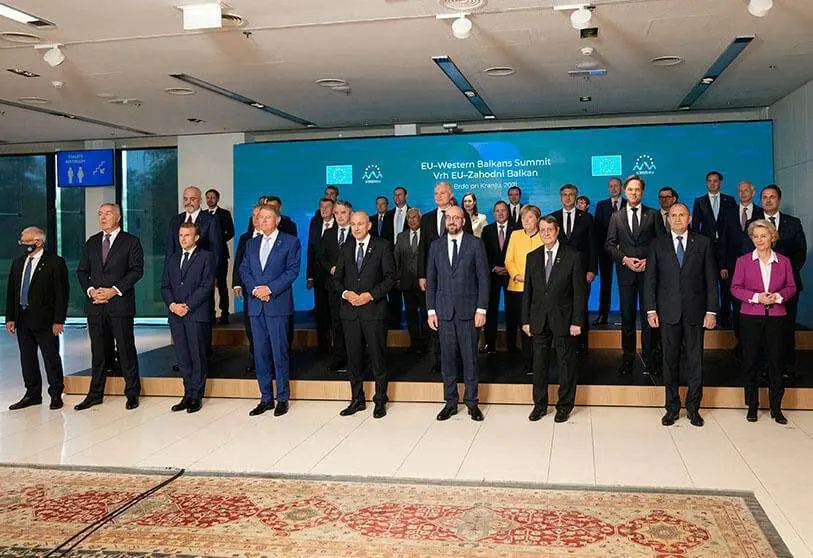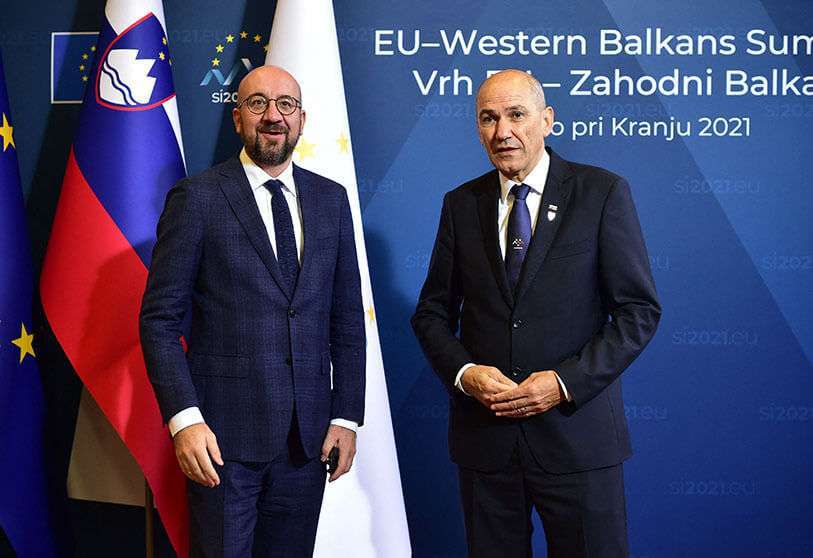The European Union continues to fail to adopt a common defence strategy

The heads of state and government of the European Union have held an informal meeting with the leaders of the Balkans in Slovenia at a summit in which they have tried to reiterate the bloc's commitment to the entire region in a European context characterised by the lack of progress in EU accession.
The meeting, which was attended by Albania, North Macedonia, Montenegro, Bosnia-Herzegovina and Kosovo, sought to highlight the strategic importance of the area for the European Union, as well as to demonstrate the good relationship between the Balkan bloc and the European Union. However, the meeting was not intended as a preamble to further integration of these countries into the EU.

On defence, one of the most sensitive issues following the reopening of the debate on whether the EU should have a common army after the withdrawal of international troops from Afghanistan and the controversy surrounding the AUKUS pact, progress has been made on the establishment of a common fund for arms cooperation. However, no conclusion has been reached on whether the EU should have specific battalions to deal with crises.
In this regard, before the meeting as such, French President Emanuel Macron told journalists that the 27-nation bloc "must do more to deal with the border crisis and be responsible for its security". Furthermore, before the summit itself began, UN Secretary General Jens Stoltenbeg criticised "the attitude of the Europeans" in this area and emphasised the creation of "competitive structures".

Referring to the consequences of the AUKUS pact, Stoltenberg empathised with French anger, saying that he "understood France's disappointment with Canberra's termination of a major contract to buy French submarines" while adding that "NATO allies agree on our overall goal of remaining united".
One of the main themes of the meeting was also how the EU should deal with China and the US, at a time when China has moved diplomatically closer to the new Taliban regime. In this regard, European Council President Charles Michel said that everyone had "looked at what happened in Afghanistan and what happened in the Indo-Pacific with China".

On China, recent talks managed to reach an agreement on a massive investment with Beijing. However, it was also agreed to approve a series of sanctions against Chinese officials for human rights abuses in Xinjiang against the Uighurs.
Michel also stressed that they would continue to pursue "our own interests, in particular with respect to China, which we see as a competitor, a partner and a systemic rival". He concluded the meeting by stressing that the identity of the European Union is "our unity" and that "the multilateral approach is the DNA of the European Union".
In an attempt to rescue the European Union's current role in foreign policy, they reiterated that the bloc must be "more effective and assertive" on the international stage, in addition to "increasing its capacity to act autonomously".

On the economic front, a note from the European Council set out the new keys that will govern the Union's new path. In the declaration, they stressed that "the European Union must increase its capacity to act autonomously as an economic power through a single market", as well as trying to "consolidate our strengths and enhance our resilience by reducing our dependencies in key sectors".
On the other hand, the plan is to seek to "reduce our dependence and promote our resilience in areas such as energy, digital, cybersecurity, semiconductors, industrial policy, trade and strengthening the internal market".
Another of the issues that marked the summit was the very presence of Kosovo, whose independence is not recognised by five EU member states, including Spain. Even so, due to the more informal nature of the meeting in a setting devoid of flags and symbols, the meeting managed to remain neutral. Therefore, the meeting managed not to interfere with the non-recognition policy of Spain, Greece, Romania, Cyprus and Slovakia.








